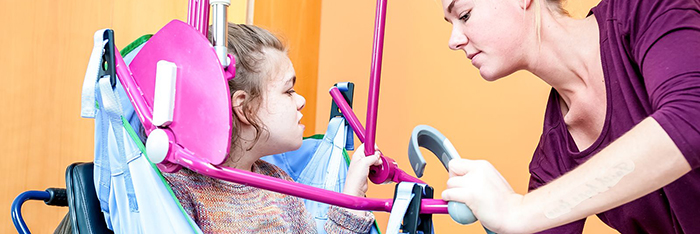Top ranked cerebral palsy claims lawyers

Our client
Sarah* (eight years old) was injured at birth when delays during her delivery meant that the supply of oxygen to her brain was reduced. This caused an acute hypoxic ischemia brain injury, resulting in severe spastic cerebral palsy.
Spastic cerebral palsy is where a child’s ability to relax their muscles is affected and the muscle tone becomes stiff and tight (hypertonia). As this condition reduces a child’s range of movement, it can interfere with speaking, eating, feeding and grasping.
The result
Our specialist cerebral palsy claim solicitors have secured judgment for Sarah and her family and the claim is now in the process of being valued by professionals, taking into consideration her ongoing needs as a result of the hypoxic ischemia brain injury sustained during birth.
The claims process
When we were approached by Sarah’s family we began an investigation into the circumstances of her birth, looking at how the acute hypoxic ischemia brain injury could have been prevented and the severe spastic cerebral palsy avoided. This involved looking into the circumstances surrounding Sarah’s birth in 2003 by obtaining medical reports for Sarah and her mother and asking experts including a midwife, an obstetrician, a neonatologist and a neurologist for their opinion on what went wrong during Sarah’s birth.
We contacted the NHS Trust on Sarah’s behalf, setting out the circumstances of her birth and where and how we believed hospital negligence had taken place to cause her spastic cerebral palsy. This included how a medical review was not obtained by the midwife, even when signs of problems began to appear, and that if delays in her delivery had been avoided, Sarah would have been born without her brain injury.
Did the hospital admit fault?
The hospital admitted that the midwife should have arranged a medical review earlier and that if this had been done Sarah would have been delivered earlier, avoiding the hypoxic brain injury and resulting spastic cerebral palsy.
The future for Sarah
Although Sarah is too young for the full extent of her spastic cerebral palsy – and her ongoing needs – to be accurately assessed for compensation, her cerebral palsy compensation claim will be valued in the near future. In the meantime, our specialist cerebral palsy claim solicitors have obtained temporary short-term payments to cover her immediate needs.
*All names have been changed for client privacy.
They have a great deal of knowledge and expertise, and client care seems to be their top priority.
Chambers Guide to the Legal Profession
Contact our expert Cerebral Palsy solicitors today for support with your claim

